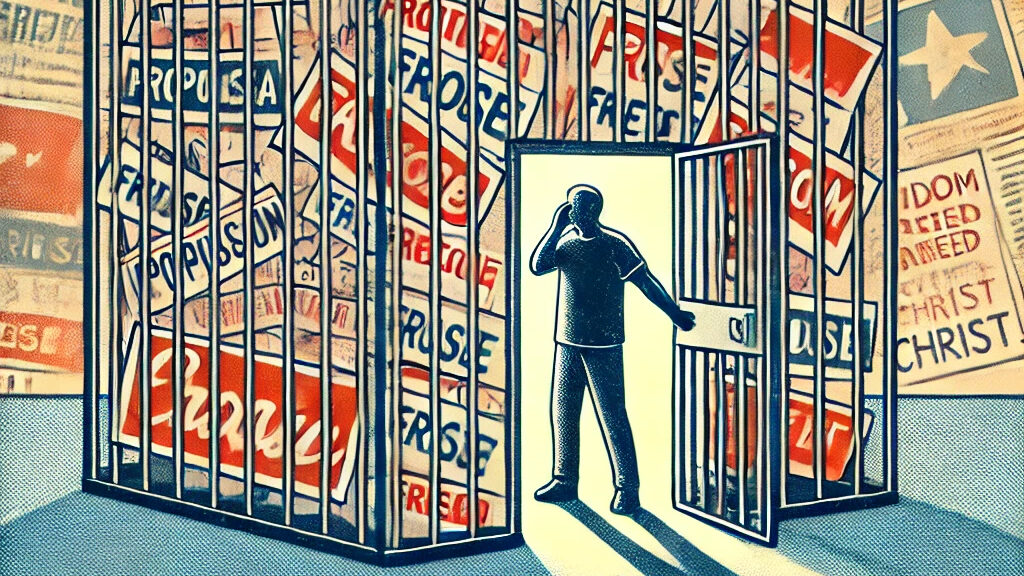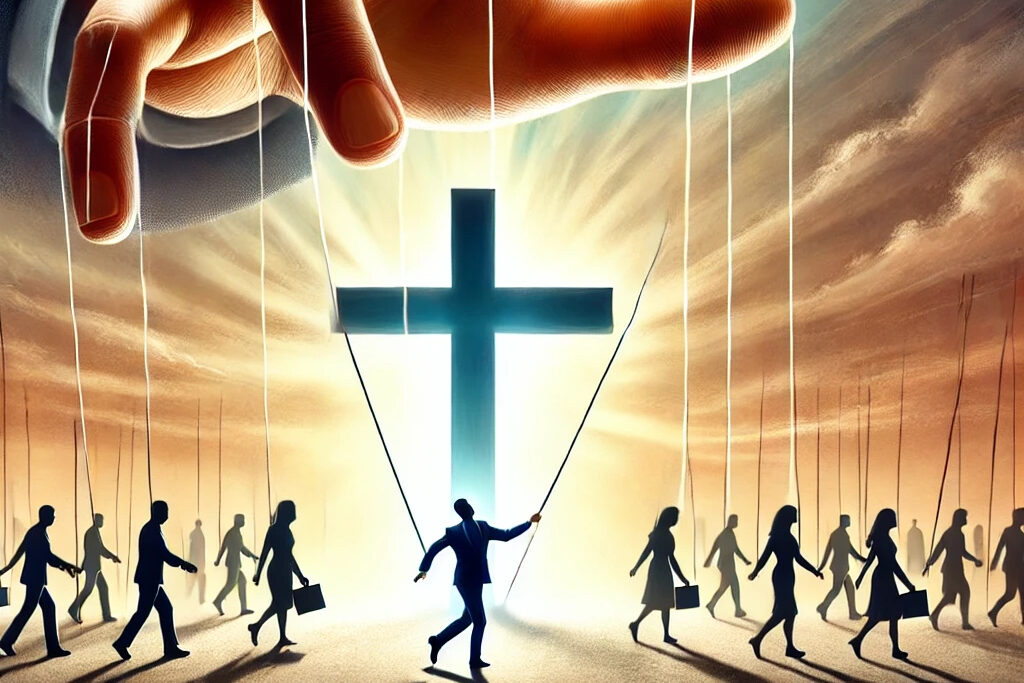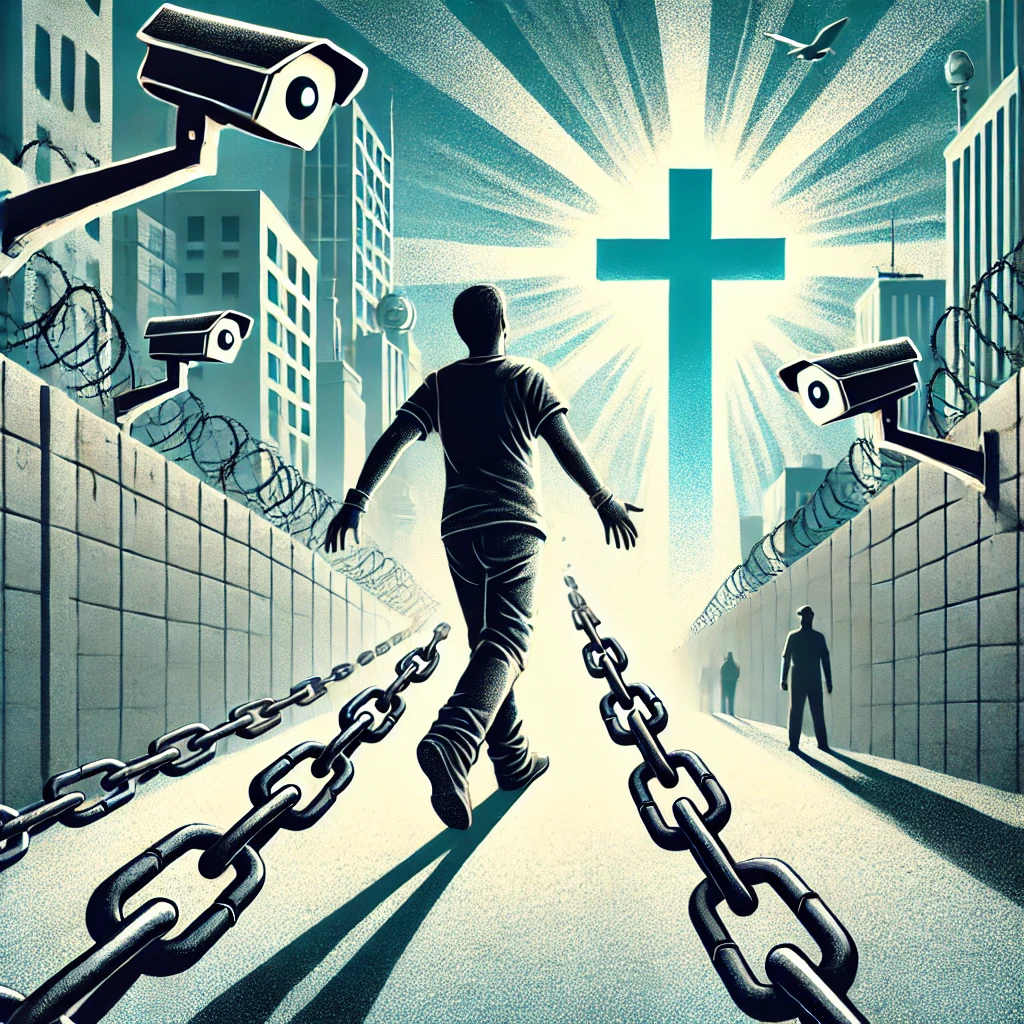近年来,越来越多的人高喊“我命由我不由天”、“虽远必诛”,仿佛命运完全掌握在自己手中。然而,在中国现实的语境下,这句话更像是一场幻象,因为在这个国家里,你是否能够出生,甚至你未来的人生轨迹,早已被政府制定的规则框架所设定。一个人的一生,从出生到死亡,无论是教育、就业,还是婚姻、生育、养老,甚至最终的火化,都在体制的掌控之下。个人的命运并不取决于自己的意志,而是在政府规划下被引导、限制和操控。然而,真正的自由并非体制可赋予,也非个人能争取,而是在基督里才能找到真正的生命自由。

一、中国人的命运从出生就已被决定
计划生育政策曾被称为“基本国策”,在控制人口增长方面所起的作用,在教育系统普及教育和社会稳定性上的贡献不容忽视。但计划生育也意味着个人的生育权利并不属于个体,而是由国家决定。独生子女政策推行的几十年里,多少人的兄弟姐妹消失在计生办的手术台上,多少家庭因为“超生”而被罚得倾家荡产。如今,生育政策的调整从一胎到二胎,再到三胎,但本质上仍然是国家在决定公民能生几个孩子。对于普通人而言,生育从来不是“自由的选择”,而是“政策允许的结果”。父母们在做爱时一想到这些政策便心生压力,满脑子都是不是要戴套?万一怀上了怎么办之类的问题,“恩爱”质量大幅度下降。更不用说嫖娼(虽然我不支持这样),都是不允许的,因为婚姻外的有偿性生活会让很多人偏离政府为本国人民规划的的“人生路线”。
回想一下在计划生育时期,如果你是独生子女,那是因为国家不允许你父母多生。如果你有兄弟姐妹,那是因为你出生的省份有不同的生育政策;再看当下鼓励生育,现在可以生三胎,但本质上仍然是政府在决定“生几个孩子是合适的”,而不是让人民群众自由选择。换句话说,大熊猫可以、猴子可以、猪狗都可以,而作为高贵的人却与之形成了鲜明对比,做爱要听指挥、生孩子也要听指挥。生育权利在政府手里,你的出生是政策决定的,而不是你父母真正的自由选择。
教育制度同样牢牢掌控着每个人的思维。中国的教育系统不是为了培养自由的思想者,而是为了塑造服从者。从小学开始,教材里灌输的意识形态决定了你如何理解世界,你是否有资格思考更大的问题。你必须按照国家制定的路线成长,考试内容是固定的,思想框架是统一的,真正的独立思考从来都不是教育的目标,服从才是最重要的结果。
中国的教育系统不是为了培养自由思想者,而是为了塑造服从者;从小学开始,教材里灌输的意识形态决定了你如何理解世界,你是否有资格思考更大的问题;真正的独立思考不是教育的目标,服从才是。换句话说,你的思想还没形成,就已经被政策决定了。
就业更是充满限制与选择的困境。体制内工作被视为“最安全的选择”,但进入体制的门槛并不公平,而是与政治背景、关系网甚至血缘关系密切相关。另一方面,体制外的工作虽然看似自由,但经济环境的政策调控让独立生存变得异常困难。房价高企、社会保障不完善、企业生存压力大,所有这些因素都在迫使个人不得不接受国家设定的职业轨迹。
体制内的工作(公务员、国企等)需要政治背景、关系网,甚至党籍才能进入;体制外的工作,看似自由,但经济环境的控制让你很难完全独立;工作机会和经济政策,决定了你的职业轨迹。你是否能“成功”,在很多情况下并不是靠能力,而是靠你是否符合体制的需要。
中国人的一生,从出生的那一刻起,几乎所有的重大决定都已经被设定好了。教育、就业、婚姻、养老,甚至连死亡的方式,也是在国家的安排下执行。
婚姻、生育、买房、养老,每一步都被体制影响,住房政策决定了房价,让你不得不在30岁前贷款买房,否则你会在社会上处于弱势;生育政策决定了你何时、是否、可以生几个孩子;养老金政策决定了你如何度过晚年,甚至连死亡后的火化,都是体制内安排好的。从出生到死亡,你的人生并不是自己决定的,而是社会系统帮你规划好了。
二、“我命由我不由天”是最大的幻象
当许多人在影院里高喊“我命由我不由天”,他们或许并没有意识到,现实中他们的人生早已被全方位无死角的各种政策掌控。
首先,体制提供了“安全的选择”,让你在控制之中获得安稳感。公务员、国企、大型事业单位等体制内岗位成为最理想的归宿,因为这些职业附带着医疗、住房、社保等一系列福利。但与此同时,这也意味着个体必须服从组织,必须顺应政治形势,必须被纳入国家管理体系之中。当很多人喊着“我命由我不由天”,他们以为自己在反抗命运,实际上只是在体制允许的范围内释放情绪,你多说一句话试试?
电影、小说、流行文化鼓励大家追求“独立自主”,但现实是:你能上的大学是国家决定的、你能找的工作是政策决定的、你能生几个孩子是政府决定的、甚至你能不能活下去,也可能由体制的医疗资源分配决定,连你的器官也是权贵的“备品备件”。真正的问题不是“由天”还是“由命”,而是“你的命是否真的由你自己掌控?”
其次,政府深知如何利用“软肋”来束缚个人。对于一个没有家庭、没有经济压力的人而言,他可能愿意为了自由去冒险,甚至反抗体制。过去,政府用“阶级斗争”来维稳,现在用“房贷、孩子、养老”来让你顺从。对于一个有家庭、有孩子、有房贷的人而言,他不得不妥协,因为孩子的教育、父母的养老、房贷的压力,都使得他无法轻易挣脱现实的枷锁。因为现阶段“跟随体制是唯一可行的路”,鲜有人敢轻易跳出这个框架。
更深层次的控制来自于集体思维模式的塑造。从小被教导“国家永远是最正确的”,任何不同的声音都会被定义为“不爱国”或者“别有用心”。当所有人都处于同一个思想体系中,就算个别人清醒过来,也很难找到另一种可能。最终,大多数人选择适应,选择在现有的体制规则下努力生存,而不是去挑战体系。
所以,在这样的环境下,高喊“我命由我不由天”不过是一种幻象。当政府能决定你的出生、你的教育、你的职业、你的退休生活,甚至最终你的火化方式时,你的命,真的由你自己决定吗?在这片土地上的主人所拥有的权力和如动物的差别显而易见。
顺便提一下印度婆罗门教,它从上到下依次是婆罗门、刹帝利、吠舍、首陀罗,普通人便是首陀罗,在这些等级之外还有贱民或称达利特,好像除了轮回、跨阶层婚姻和工作分工外,无论是首陀罗还是达利特都可以自由生育。
三、基督信仰如何带来真正的自由

面对这样的人生现实,我们如何才能真正获得自由?答案不在于盲目反抗,也不在于逃避,而是在基督里找到真正的自由。就像一个人不要随口喊出“我命由我不由天”这样的口号一样,个人非常希望更多的人尽量不要说自己什么都不信,或只信你自己之类的言词,可以尝试着多学习一些圣经知识或许会让你的生活更加和谐、做事更有逻辑性。在此我想将圣经里的一些观点列出来供参考:
第一,基督教导我们:人的生命不属于政府,而属于创造主。政府可以决定你的身份证号码,决定你的户籍,甚至可以剥夺你的经济自由,但它无法控制你的灵魂。圣经说:“你们必晓得真理,真理必叫你们得以自由。”(约翰福音 8:32)这意味着,真正的自由来自于对真理的认识,而不是被世俗的制度所束缚,这是所有启蒙认知的开端。
第二,基督的信仰赋予人独立思考的能力,让人不再被谎言和恐惧控制。政府的宣传、教育、舆论引导,都是为了让人服从,而不是为了让人自由。但在基督里,我们被教导要“察验何为神的善良、纯全、可喜悦的旨意”(罗马书 12:2)。信仰帮助我们看透世界的虚假,让我们不再轻易被情绪、宣传和外界压力所操控。
第三,基督信仰使我们不再害怕失去,而是在永恒中找到真正的依靠。体制之所以能够控制人,是因为人害怕失去:害怕失去工作、害怕失去房子、害怕失去家庭这些肉体依赖的东西。但耶稣说:“凡劳苦担重担的人,可以到我这里来,我就使你们得安息。”(马太福音 11:28)当一个人知道自己的身份在神里面,他就不会因为世俗的压力而妥协,而是会有勇气追求真正的自由,为神所预备的人生去奔放生活。
四、真正的自由不在体制之内,而在基督之中

如果你只是被社会牵着走,被情绪控制,被宣传引导,那你无权说“我命由我不由天”。真正的自由,不是体制内的安稳工作,不是高薪,不是房产,也不是孩子的学区,而是灵魂的自由。当你知道你是谁,你来自哪里,你最终要去哪里,你才真正掌握了自己的人生。
在这个体制之下,突破口或许很小,但它始终存在。认清现实,寻找独立的道路,拒绝被宣传所迷惑,不被各种社交平台左右自由思想的能力、勇敢面对自己的选择。自由不是政府给予的,而是你敢于挣脱一切束缚去追寻的。在基督里,你才能找到最终的自由。因为人的命,真正掌管者不是国家,也不是自己,而是神。唯有他,才能带领我们走向真正的自由之路。
“所以天父的儿子若叫你们自由,你们就真自由了。”(约翰福音 8:36)
请弟兄姐妹们一起为此祷告!
Slogans Without Thought Cannot Replace True Freedom in Faith
In recent years, more and more people have been shouting slogans such as “My life is mine, not dictated by heaven” and “No matter how far, they must be slain,” as if their destiny were entirely in their own hands. However, in the context of contemporary China, such statements are little more than illusions. In this country, whether you are even born—and if you are, the trajectory of your entire life—is predetermined by a framework of rules set by the government. An individual’s life from birth to death—including education, employment, marriage, childbearing, retirement, and even the manner of final cremation—is all subject to the control of the state. One’s fate is not decided by personal will but is directed, constrained, and manipulated according to government policy. True freedom is neither granted by the system nor can it be wrested out by personal effort—it is found only in Christ, where true freedom of life begins.
I. A Life Predetermined from Birth
The family-planning policy was once regarded as a “basic national policy.” Its role in controlling population growth and its contribution to widespread education and social stability cannot be ignored. However, family planning also means that personal reproductive rights do not belong to the individual but are decided by the state. During the decades when the one-child policy was enforced, countless siblings vanished on the operating table of the birth-control office, and many families were financially ruined for having “extra” children. Although current policies have been adjusted—from one child to two, and now to three—the essence remains the same: the state determines how many children citizens may have. For ordinary people, reproduction is never a “free choice” but rather the outcome of what policy permits. Even the most intimate moments—when parents decide to make love—are burdened by thoughts of whether one must use protection or what would happen if an unplanned pregnancy occurs. The quality of “togetherness” declines all the more, not to mention that extramarital, commercial sexual behavior is prohibited because it might divert people from the “life plan” the state has mapped out for its citizens.
Consider that during the era of strict birth control, being an only child was not a personal choice but a state mandate; if you had siblings, it was only because the birth policies in your province differed. Even now—when the state encourages having up to three children—the decision about how many children are “appropriate” is still made by the government rather than by free will. In other words, while animals such as pandas, monkeys, or even pigs and dogs can reproduce freely, humans—deemed noble—are forced to follow instructions in matters of intimacy and childbearing. Reproductive rights lie in the hands of the state; your very birth is decided by policy rather than by your parents’ free choice.
The education system is equally controlling of every person’s mind. China’s education is not designed to cultivate free-thinking individuals; rather, its purpose is to shape obedient subjects. From elementary school onward, textbooks instill an ideology that dictates how you are to understand the world and even whether you are deemed qualified to ponder larger questions. You must grow up following a national curriculum, taking fixed tests and conforming to a unified mindset. True independent thought is never the goal of education—the goal is obedience.
China’s education system is not designed to produce free thinkers, but to mold obedient ones; From elementary school onwards, the ideologies instilled in textbooks determine how you understand the world and whether you are qualified to think about bigger issues; True independent thinking is not the goal of education, obedience is. In other words, your mind has not yet been formed, and it has already been decided by policy.
Employment, too, is fraught with constraints and limited choices. Jobs within the system are seen as “the safest option,” yet entry into state-run institutions is far from fair—it hinges on political background, personal networks, or even family ties. On the other hand, while jobs outside the state may appear to offer freedom, economic policies and market controls make independent survival extremely difficult. Skyrocketing housing prices, imperfect social security, and the intense pressure on enterprises all force individuals into accepting the career paths set by the state.
Jobs within the system (civil servants, state-owned enterprises, etc.) require political background, networking, and even party membership to enter; Work outside the system seems to be free, but the control of the economic environment makes it difficult for you to be completely independent; Job opportunities and economic policies determine the trajectory of your career. In many cases, whether you can “succeed” depends not on your ability, but on whether you meet the needs of the system.
From the moment you are born, nearly every major aspect of your life—education, employment, marriage, retirement, and even the way you are cremated—is predetermined. Housing policies dictate property prices, compelling you to take out loans before you hit 30 lest you fall behind socially; family-planning policies decide if, when, or how many children you may have; pension policies govern how you spend your twilight years; even the method of cremation is arranged by the system. From birth to death, your life is not your own to direct—it is planned out by a social system.
II. “My Life Is Mine, Not Dictated by Heaven” Is the Greatest Illusion
When people in theaters boldly shout “My life is mine, not dictated by heaven,” they may not realize that, in reality, their lives are already under complete and comprehensive control by an array of state policies.
First, the system offers “safe choices” that provide a sense of security within control. Positions in the civil service, state enterprises, and large public institutions are considered the ideal destination because these jobs come with medical care, housing, social security, and other benefits. Yet this also means that individuals must submit to the organization, follow political trends, and be absorbed into the state’s management system. When many shout “My life is mine, not dictated by heaven,” they believe they are rebelling against fate, but in truth, they are merely venting within the boundaries allowed by the system. You might try to speak out—and see if you can say one more word!
Movies, novels, and popular culture encourage the pursuit of “independence,” but the reality remains: the university you attend is determined by the state; the job you secure is dictated by policy; the number of children you can have is decided by the government; even whether you survive may depend on how medical resources are allocated—and even your organs can become “spare parts” reserved for the elite. The true question is not whether your fate is determined by “heaven” or “destiny” but whether it is truly in your own hands.
Secondly, the government knows all too well how to use “soft spots” to bind individuals. A person without family or economic pressure might be willing to risk everything for freedom or even rebel against the system. In the past, the state maintained stability through “class struggle”; now it uses burdens like mortgages, childrearing, and elderly care to ensure your compliance. For someone with a family, children, and a mortgage, compromise is inevitable—concerns over children’s education, elderly care for parents, and mortgage pressures make it nearly impossible to break free. In today’s environment, “following the system is the only viable way,” and very few dare to step outside that framework.
A deeper level of control comes from the shaping of collective thought. From a young age, people are taught that “the state is always right” and that any dissenting voices are labeled “unpatriotic” or “malicious.” When everyone is confined to the same mindset, even if a few awaken to a different possibility, it is extremely difficult to find an alternative. Ultimately, most people choose to adapt and struggle to survive under the existing rules rather than challenge the system.
Thus, in such an environment, shouting “My life is mine, not dictated by heaven” is nothing more than an illusion. When the state can determine your birth, your education, your career, your retirement, and even the way you are cremated, can you really claim that your life is your own? The disparity between the power held by those who rule this land and the helplessness of its citizens is all too clear.
(As an aside, consider the Indian Brahmanical system—from Brahmins and Kshatriyas to Vaishyas and Shudras—and beyond these, the untouchables (Dalits). Aside from beliefs in reincarnation, restrictions on inter‑caste marriage, and rigid work divisions, both Shudras and Dalits enjoyed freedom to reproduce.)
III. How Does the Christian Faith Bring True Freedom?
Facing this life’s reality, how can we truly obtain freedom? The answer is neither to blindly rebel nor to escape—it is to find true freedom in Christ. Just as one should not casually shout slogans like “My life is mine, not dictated by heaven,” individuals are encouraged not to declare that they believe in nothing or only in themselves. Instead, try learning more about biblical truth; it might make your life more harmonious and your actions more logical. Here are some key biblical perspectives for your consideration:
- Christian teaching reminds us that our lives do not belong to the government but to our Creator.
While the government may decide your identification number, your household registration, and may even strip you of economic freedom, it cannot control your soul. The Bible declares, “And you will know the truth, and the truth will set you free” (John 8:32). This means that true freedom arises from knowing the truth—and not from being bound by secular systems—which is the starting point of enlightened understanding.
- The Christian faith equips us with the ability to think independently so that we are no longer controlled by lies or fear.
Government propaganda, education, and media are designed to make you obedient, not free. But in Christ we are taught to “test and approve what God’s will is” (Romans 12:2). Faith helps us see through the deceptions of the world so that we are no longer easily manipulated by emotions, propaganda, or external pressures.
- The Christian faith frees us from the fear of loss by revealing our eternal security.
The state is able to control us because we fear losing our jobs, homes, or families—our material attachments. But Jesus says, “Come to me, all you who are weary and burdened, and I will give you rest” (Matthew 11:28). When you know your identity is rooted in God, you will not be forced to compromise by worldly pressures but will have the courage to pursue the life that God has prepared for you.
IV. True Freedom Lies Not Within the System, but in Christ
If you are simply led by society, controlled by your emotions, or manipulated by propaganda, then you have no right to claim “My life is mine, not dictated by heaven.” True freedom is not found in the stable job within the system, not in a high salary, not in real estate, or even in having children in the best school district—it is the freedom of the soul. When you know who you are, where you come from, and where you are ultimately going, you truly take control of your own life.

Under this system there may be only a small breakthrough, but it exists. Recognize reality, seek an independent path, refuse to be misled by propaganda, and do not let social platforms rob you of your ability to think freely. Freedom is not granted by the government—it is won by daring to break free from all constraints. In Christ, you will find ultimate freedom. For in truth, the master of your life is not the state, nor is it you—it is God. Only He can lead us on the path to genuine freedom.
As Jesus said, “So if the Son sets you free, you will be free indeed” (John 8:36).
Please, dear brothers and sisters, let us all pray together for this!

发表回复